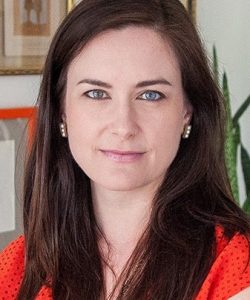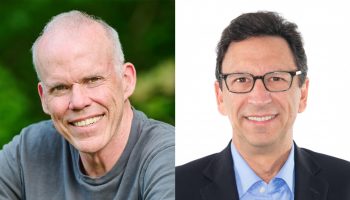During President George W. Bush’s second term, Katharine Wilkinson noticed people were talking past each other, not to each other, about climate change — even when they shared a lot of the same concerns.

As she grappled with this, she found others with a similar attitude though the The Evangelical Climate Initiative Launch. This organization had bought a full page ad in The New York Times that stated, “Our commitment to Jesus Christ compels us to solve the global warming crisis,” and it was signed by many high-profile evangelical leaders.
“I just was like ‘Where did this come from?’” Wilkinson said. “I had been thinking about this intersection, but it totally surprised me.”
The ad motivated her to continue studying evangelical engagement on climate change, eventually getting a Rhodes Scholarship to attend Oxford and writing Between God and Green: How Evangelicals Are Cultivating a Middle Ground on Climate Change, which delved into the relationship between modern religion and the climate change movement.
For her lecture at 10:45 a.m. EDT Wednesday, July 1, on the CHQ Assembly Video Platform, she wants to grapple with questions like what it means to be human on a changing planet; how society can be radically reshaped to come back into balance with the planet’s living system; and how the task at hand — her lecture title is “How to Reduce Greenhouse Gases” — can be addressed rapidly. Her lecture is part of Week One: “Climate Change: Prioritizing Our Global and Local Response.”
“In a lot of ways, the lecture is kind of my effort at mapmaking, as sort of a cartography of this moment that we find ourselves in. … I think (these times) can be really confusing and really hard to make sense of,” she said.
Wilkinson’s climate change journey began when she was 16 and spent a semester living in the woods at The Outdoor Academy in the Appalachian Mountains in western North Carolina. As one of 25 students, she awakened to the challenges facing the planet, and learned what it meant to be part of the solution.
“I kind of carried that fire in the belly back home to Atlanta (and) with me through high school, and then I got even more deeply engaged in both study, (and) also activism as an undergraduate student,” Wilkinson said. “It just kind of kept snowballing from there.”
As an undergraduate, she majored in religion, and two of her professors also taught in her field and environmental studies. The intersections in her college classes between religion and the environment excited Wilkinson.
“My undergraduate adviser actually had a (saying) that specialization is for insects,” she said. “And I have kind of been a hopeless interdisciplinary on my winding path.”
This winding path brought her to research the connection between climate and gender, and the realization that the impacts of climate change are not gender-neutral. Wilkson said that women and girls, particularly those of color, those who are indigenous or who live in poor, rural areas, are impacted first and worst by climate change. Women and girls are more likely to die, be injured in a natural disaster, or be vulnerable to sex trafficking; and often bear the burdens of gathering firewood, water and growing food.
In addition to her work with gender and religion, Wilkinson also works on researching the connection with leadership and climate change. Wilkinson said that transformational leadership comes from women and girls in the climate movement.
She is co-editing an anthology of writing by women climate leaders, to be released in September, titled All We Can Save: Truth, Courage, and Solutions for the Climate Crisis. Contributing writers include a diverse group — from strategists and scientists to teenage activists and grandmothers from across the United States.
“It’s this wonderful kind of patchwork quilt,” Wilkinson said.
Wilkinson and her co-editor, Ayana Elizabeth Johnson, are including poetry and visual art in the anthology as well, to connect readers to the climate crisis both emotionally and spiritually.
“We need to have ways to come to this topic with our heads, but also with our hearts and, and ultimately with our hands,” Wilkinson said. “It’s a collection that is super accessible and also really welcoming. Because, to change everything, it’s going to take everyone. And we really need the largest and strongest team possible.”
This program is made possible by the David and Wendy Barensfeld Lectureship.




